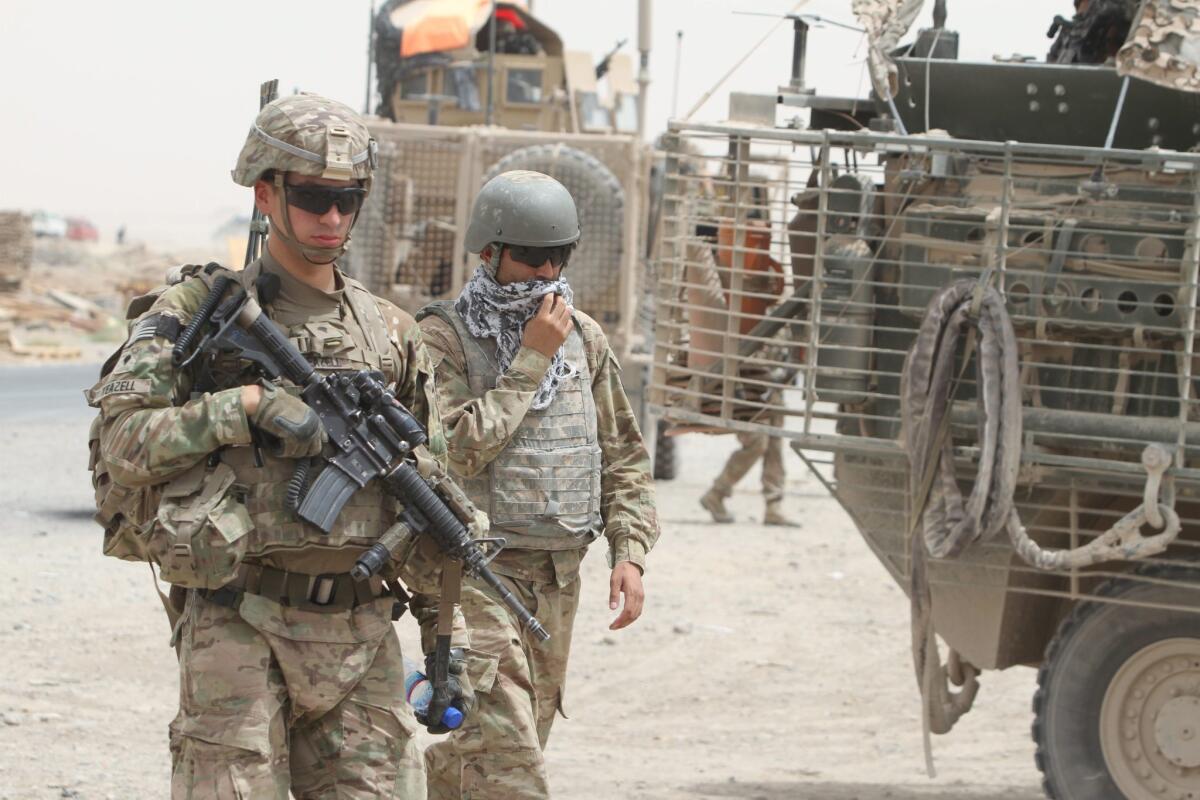A report card for U.S. policy in the Mideast

- Share via
Think the United States is fairing badly in the Middle East? Convinced that our policy is chaotic, confused and contradictory, from North Africa to the Persian Gulf?
Think again. It may not be politically correct to admit it, but when it comes to furthering America’s core national interests, Washington isn’t doing badly at all. And here’s why.
Defining U.S. national interests is a critically important task, and not enough attention is paid to it. If you don’t know where you’re going, the old saw goes, any road will get you there. And we’ve seen the consequences of that in Afghanistan and Iraq.
America’s interests in the Middle East have changed over the years. But in 2013, in addition to ensuring the security of Israel, the U.S. has five vital ones and a couple that are less so. Here’s the report card on them:
Getting out of Iraq and Afghanistan early: A-
The two longest and among the most profitless in U.S. history, these two wars have claimed more than 6,000 U.S. dead; tens of thousands wounded, many grievously; billions of dollars expended; and shattered credibility from one end of the Middle East to the other. The process of extrication isn’t pretty, nor is what America will leave behind. But leaving is crucial. Considering what the U.S. sacrificed and what we’ve gotten in return, we stayed far longer than necessary.
Preventing an attack at home: A-
The organizing principle of a nation’s foreign policy is to protect the homeland. Despite a few near misses and some deadly and tragic lone-wolf attacks since 9/11, the efforts of the Bush and Obama administrations have prevented another Al Qaeda spectacular against the U.S. at home. This is no small accomplishment given the vast size of the country, its vulnerabilities and the determination of a number of groups emanating from the Middle East and South Asia to inflict catastrophic damage on the United States.
Reducing U.S. dependence on Arab hydrocarbons: B
In 2011, the U.S. imported 45% of the liquid fuels it used, down from 60% just six years earlier. As energy guru Daniel Yergin points out, a new oil order is emerging. And for the U.S., that means the rise of Western Hemispheric energy at the expense of the Middle East. Between new oil in Brazil, oil-sands production in Canada and shale-gas technology here at home, by 2020 we could cut our dependence on non-Western Hemisphere oil by half. Combine that with the rise in national oil production and greater focus on fuel efficiency and conservation, and the trend lines are at least running in the right direction.
Preventing Iran from getting a nuke: I for incomplete
There’s only one thing worse than Iran with nukes, and that’s actually going to war with Tehran to prevent it and failing. Therein lies the Obama administration’s conundrum. Sanctions have hurt and to a degree imposed a serious cost on Iran. The question for 2013 and beyond is whether diplomacy and the threat of force will be able to bring Iran to the table and to a negotiated deal. The fact is, had the shah not been toppled by the mullahs, Iran would have already been a nuclear power, albeit a pro-Western one. And without changing the government, the best the West is likely to do is to keep the Iranians several years away from weaponizing.
But given the fact that only one country can stop Iran from acquiring nuclear weapons (Iran itself, if it concludes that the cost of acquisition is too high a price to pay), it’s hard to see how the Obama administration can do much more than outline clearly what Iran has to give up and what it will gain if it does.
In addition to these objectives, we have two more discretionary interests: brokering Arab-Israeli peace and supporting democratization in the Arab world. They are discretionary not because they lack importance but because America’s capacity to significantly shape their outcomes is limited without local ownership and resolve. Whether it’s the Syrian civil war or the recent violence and turmoil in Egypt, these are long movies that will take years to play out. And America is not the central actor.
As Secretary of State John F. Kerry’s recent effort has shown, the Israeli-Palestinian issue still offers a greater possibility for a consequential role. But that depends almost entirely on whether Israel and the Palestinian Authority come to own their negotiations and really want to get something done.
That America’s report card looks pretty good doesn’t mean we should be happy about the current state of affairs. U.S. credibility and its image in the Middle East have taken a real beating. And our policy on the so-called Arab Spring, or what’s left of it, is pretty much at sea, largely because we can’t shape the internal dynamics of these societies.
Still, on many things that really count and those we can actually affect, the situation isn’t as gloomy as many suppose. We are now less bogged down in the Middle East than ever before. That growing independence — along with a recognition that there are limits to U.S. power and we can’t fix everything — is a good thing. And it couldn’t have come at a better time, particularly for a nation whose own house is so badly in need of repair.
Aaron David Miller, vice president for new initiatives at the Woodrow Wilson International Center for Scholars, served as a Middle East negotiator in Republican and Democratic administrations. He is the author of “The Much Too Promised Land: America’s Elusive Search for Arab-Israeli Peace.”
More to Read
A cure for the common opinion
Get thought-provoking perspectives with our weekly newsletter.
You may occasionally receive promotional content from the Los Angeles Times.










